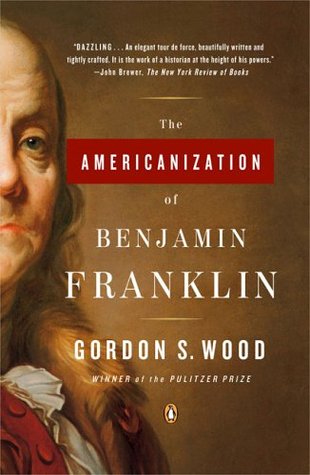Gordon S. Wood’s Americanization of Benjamin Franklin is a welcome testimony to the renewed interest in America’s Founding Fathers. Although most Americans have a clear idea as to the importance of Washington’s military role and Jefferson’s contribution in writing the Declaration of Independence, few appreciate the pivotal part Franklin played in legitimizing the Revolution among foreign powers. Indeed—as Wood points out so clearly—without Franklin, funding from France would have been impossible, and the Revolution would have failed. According to Wood, it was Franklin’s personal charm and his friendship with Charles Vergennes, who became virtually first minister under Louis XVI, that moved the French to lend the Americans the money they needed to fight the British. Furthermore, the personality and writings of Franklin, as Wood explains, were instrumental in forming the ethos of the hard-working, self-made man that led eventually to the establishment of America’s middle class.
This book is not a biography but the story of how Franklin, the loyal Tory, came to embrace the American Revolution. Franklin’s break with England formally took place in 1775 in the wake of the display of arrogance by the British government toward the rights of the colonists, precipitated by the passage of the Coercive Acts (1774), which closed Boston Harbor in retaliation for the Tea Party. For Franklin, this was not merely a political faux pas; the contempt with which he was treated by the British was a deeply personal affront to his dignity. It seems that Franklin gradually (if also grudgingly) came to the realization that England regarded America as essentially a source of raw materials. Despite Franklin’s hopes of persuading King George’s government to allow American representation in Parliament, it became clear that this was not to be the case.
A good part of the book is dedicated to Franklin’s efforts to establish himself as a gentleman. The 18th century defined such a person as “one who is master of his own time.” By achieving his goal, Franklin gained the status and time necessary to devote himself to public affairs. He was an overwhelming success at this endeavor, thanks to a prodigious intellect, a strong desire to perfect himself in virtue, an entrepreneurial spirit, and an agreeable personality. His famous Poor Richard’s Almanac was probably America’s first offering in the literary genre known today as the “self-help book.” The proverbs therein captured, or perhaps invented, the American “can do” spirit and greatly contributed to the rugged individualism that enabled the rapid growth in American industry and the wealth it created.
As a scientist and philosopher, Franklin was a world-renowned celebrity. He reveled in the respect his reputation garnered for him both in England and in France, where he spent the greater part of his later years after retirement from his printing business. So great was Franklin’s love of Europe and Europe’s love of Franklin that many doubted his loyalty to the American cause. This doubt earned for him some strong enemies in the new republic, who, upon his death in 1790, successfully dampened celebrations of his life and legacy. His loyalty, however, deserved no such doubt. So adamant was Franklin about the righteousness of the colonists’ cause that he broke forever his relationship with his once doted-upon son William who, as the crown-appointed governor of New Jersey, remained loyal to England. Franklin’s fame, according to Wood, revived only in the 19th century, and then on account not of his diplomatic accomplishments but of his writings, which were used to inspire virtue and industry among the youth of the burgeoning American population.
Wood shows us why Franklin belongs in the pantheon of American revolutionary heroes on equal footing with Washington, Adams, Jefferson, and Hamilton. His book is a good start in reacquainting America with a national treasure who, early in the life of our republic, made a vital impact on the international scene that enabled the Revolution to succeed and whose literary contributions set the tone for the culture that permeates America to this day.
[A Master of His Time The Americanization of Benjamin Franklin, by Gordon S. Wood (New York: Penguin Press) 320 pp., $25.95]

Leave a Reply